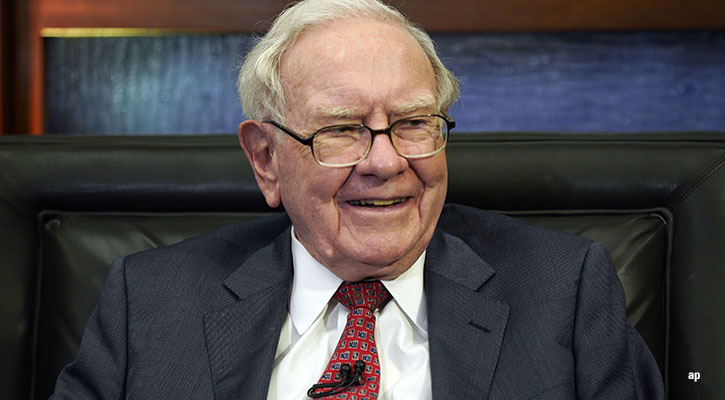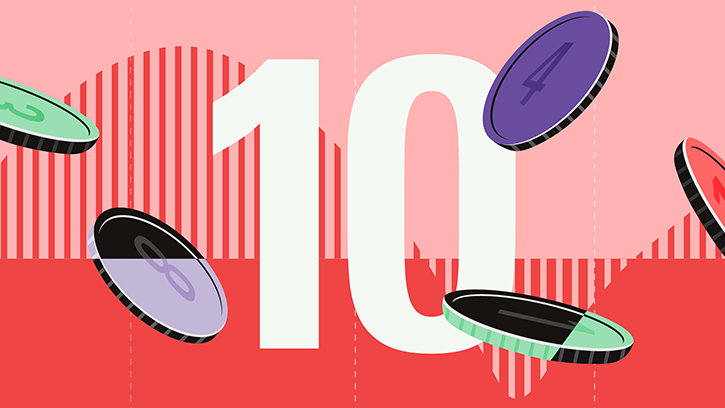Berkshire Hathaway (BRK.A/BRK.B) released its second-quarter earnings report on August 5. Here’s Morningstar’s take on Berkshire’s earnings and stock.
Key Morningstar Metrics for Berkshire Hathaway
• Fair Value Estimate BRK.A: $640,000
• Fair Value Estimate BRK.B: $427
• Morningstar Rating: ★★★
• Morningstar Economic Moat Rating: Wide
• Morningstar Uncertainty Rating: Low
What We Thought of Berkshire Hathaway's Q2 Earnings
• Overall Results: Operating earnings, exclusive of investment gains/losses, increased 15.5% year over year to $11.6 billion during the June quarter and 26.0% to $22.8 billion over the first half of the year. Strong insurance results continued to compensate for weakness in other segments. Berkshire’s insurance operations – which account for more than a third of its earnings on average and half of our valuation – continued to post solid premium growth owing to better pricing in most business lines, as well as outstanding operating profitability due to better pricing, lower claims costs, and a dearth of major catastrophe losses. Investment income provided an added boost, given all the cash Berkshire has invested in T-bills.
• Railway and Energy Units Dampen Earnings: BNSF Railway and Berkshire Hathaway Energy continue to weigh on results. BNSF has maintained its practice of sacrificing more in pricing than its closest competitor, Union Pacific, to secure solid volume growth, which has hurt profit margins. Normally a pillar of stability, BHE reported revenue of $2.2 billion during the first half of 2023 and 2024, well off the $2.9 billion in 2021-22.
BHE has also seen earnings impacted the past two years by loss accruals for litigation arising from wildfires in California in 2020 and Oregon in 2022. Homeservices of America has been negatively affected by the rapid rise in interest rates over the past couple of years. While we view these as blips in BHE’s overall results, it has been frustrating to see one of the firm’s more stable businesses upended by events mostly outside its control.
• Insurance Investment Portfolio Generating More Income as Mix Shifts: As Warren Buffett has put more capital into Treasury bills and reduced Berkshire’s exposure to low-dividend-yielding stocks, its insurance investment portfolio has seen a large uptick in investment income, rising from $1.4 billion in the fourth quarter of 2021 to $6.9 billion in the second quarter of 2024. It will likely remain at that level, given Berkshire’s commitment of another $80 billion to T-bills during the second quarter. This rise, along with the uptick in stock sales this past year, is all realized tangible income and won’t be impacted by future volatility in the equity markets.
• Berkshire Continues to be a Net Seller of Equities: After trimming its stake in Apple (AAPL) by about 13% in the first quarter of 2024, Berkshire cut its stake 50% in the second quarter, noting in its quarterly report that its Apple stake was worth $84.2 billion (equivalent to 399.8 million shares) at the end of June, compared with $135.4 billion (789.4 million shares) at the end of March. It sold off Paramount Global (PARA) and trimmed its stakes in Chevron (CVX), Louisiana-Pacific (LPX), and Sirius XM Holdings (SIRI) in the first quarter. The firm also reduced its Bank of America (BAC) shares this past month, selling more than 90.4 million shares for proceeds of $3.8 billion. That said, Berkshire retains meaningful stakes in Apple and Bank of America despite the cuts to its holdings.
• Cash Pile Rises to a Record $277 Billion: Going into Berkshire’s annual meeting, we noted that Buffett somewhat painted the firm into a corner by commenting in May 2017 (when the company had $96.5 billion in cash and cash equivalents on hand) that it would be difficult to defend holding $150 billion or more three years hence.
For most of the past seven calendar years, he kept cash balances below that threshold, but that dam broke in the third quarter of 2023, and it posted a balance of $276.9 billion for this quarter. Buffett doesn’t talk about that threshold anymore. We’re surprisingly less concerned with the issue than we usually are, primarily because short-term rates are still above 5% and Berkshire had $234.6 billion invested in T-bills at the end of June 2024.
Fair Value Estimate for Berkshire Hathaway
With a 3-star rating, Berkshire Hathaway stock is fairly valued compared with our fair value estimate.
Our fair value estimate for Berkshire remains at $640,000 per Class A share and $427 per Class B share, equivalent to 1.45 times our estimates for its book value per share at the end of 2024 and 1.35 times our estimate for 2025. For perspective, over the past five years, the shares have traded at an average of 1.43 times the trailing calendar year-end book value per share, and 1.44 times over the past 10 years.
While Berkshire is generally viewed as a defensive stock, rising when the equity markets are in the tank and struggling to keep pace with the S&P 500 Index when market returns exceed 10%, so it was interesting to see the shares up around 20% since the start of the year as of last Friday’s market close of $641,435 ($428.36) per Class A (B) share relative to the 13% gain posted for the benchmark index. We also found it surprising to see the shares trade as high as $671,370 ($446.15) per Class A (B) share on July 17, 2024, which was equivalent to 1.72, 1.53, and 1.42 times estimated book value per share for 2023, 2024, and 2025, respectively, well beyond their normal range.
Berkshire Hathaway's Economic Moat Rating
We’ve historically believed that Berkshire’s moat is more than the sum of its parts, although the parts are fairly moaty on their own. The insurance operations – Geico, Berkshire Hathaway Reinsurance Group, and Berkshire Hathaway Primary Group – remain important contributors to the overall business. Not only are they expected to account for around 32% of the firm’s pretax earnings (and 50% of our valuation of it), but they are overcapitalized, maintaining a larger-than-normal equity investment portfolio for a property and casualty insurer.
They also generate low-cost float (temporary cash holdings arising from premiums collected in advance of future claims). This lets Berkshire generate returns on these funds with assets commensurate with the duration of the business being underwritten. And they tend to come at little to no cost to Berkshire, given the company’s proclivity for generating underwriting gains over the past several decades.
Financial Strength
Berkshire’s strong balance sheet and liquidity are among its most enduring competitive advantages. Its insurance operations are overcapitalized, carrying greater equity, fixed income, and cash relative to its reserves. The company generates large amounts of free cash flow and maintains significant cash on its balance sheet, amounting to $167.6 billion at the end of 2023.
Berkshire likes to keep $30 billion in cash on hand as a backstop for its insurance operations, with each of the firm’s businesses likely requiring at least 2% of annual revenue as operating cash, with additional carve-outs set aside for capital expenditures. As a result, by our estimate, Berkshire entered 2024 with an excess cash balance of around $126 billion – dry powder that could be used for acquisitions, investments, share repurchases, or dividends.
Our Uncertainty Rating for Berkshire is Low. We do not consider any environmental, social, or governance issues material enough to affect our uncertainty rating. This is due to the firm’s lower exposure to some of the main ESG risks inherent to its industries.
Risk and Uncertainty
That said, Berkshire has tended to score lower on governance issues because of the makeup of its board and board committees, the unequal voting structure of its Class A and Class B shares, and its opaqueness and lack of engagement on governance issues.
Following the death of Charlie Munger in November 2023, Berkshire’s main employee risk rests with CEO Warren Buffett, who has been responsible for almost all the firm’s investment and capital allocation decisions. With Buffett turning 94 at the end of this month, it is increasingly probable that our valuation horizon will exceed his lifespan, with the quality of investment returns and capital allocation likely being affected.
Berkshire Hathaway Bulls Say
• Book value per share, a good proxy for measuring changes in Berkshire’s intrinsic value—increased at an estimated 18.3% CAGR during 1965-2023, compared with a 10.2% annualized return for the S&P 500 TR Index.
• Berkshire’s stock performance has generally been solid, increasing at a 12.1% (11.8%) CAGR during 2019-23 (2014-23), compared with a 15.7% (12.0%) average annual return for the S&P 500 TR Index.
• At the end of 2023, Berkshire had $168.9 billion in insurance float. The cost of its float has been negative for much of the past two decades.
Berkshire Hathaway Bears Say
• Given its size, Berkshire’s biggest long-term hurdle will be its ability to consistently find meaningfully large deals that add value.
• Another big issue facing the firm is the longevity of CEO Warren Buffett (who turns 94 at the end of this month), especially following the death of longtime managing partner Charlie Munger in November 2023.
• Berkshire’s insurance business faces competitive and highly cyclical markets that occasionally produce large losses, and several of its noninsurance operations are economically sensitive and focused on US markets.
This article was compiled by Tom Lauricella.






























